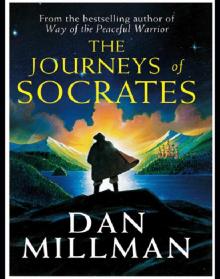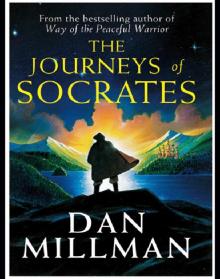- Home
- Dan Millman
WAY OF THE PEACEFUL WARRIOR: A Book That Changes Lives Page 2
WAY OF THE PEACEFUL WARRIOR: A Book That Changes Lives Read online
Page 2
“Yes. How did you get from that chair,” I pointed, “up to that roof, in less than twenty seconds? You were leaning back against the wall, right there. I turned, walked over to the corner, and you... ”
“I know exactly what I was doing,” his voice boomed. “There is no need to describe it to me. The question is, do you know what you were doing?”
“Of course I know what I was doing!” I was getting angry now; I wasn’t some child to be lectured to! But I desperately wanted to find out the old man’s gimmick, so I held my temper and requested politely, “Please, sir, tell me how you got up on the roof.”
He just stared down at me in silence until the back of my neck began to get prickly. Finally he replied, “Used a ladder. It’s around back.” Then, ignoring me, he looked upward again.
I walked quickly around back. Sure enough, there was an old ladder leaning crookedly against the back wall. But the ladder’s top was at least five feet short of the roof’s edge; even if he could have used it — which was highly doubtful — that wouldn’t explain how he got up there in a few seconds.
Something landed on my shoulder in the darkness. I gasped, and whirled around to see his hand. Somehow he’d gotten off the roof and crept up on me. Then I guessed the only possible answer. He had a twin. They obviously got their kicks scaring the wits out of innocent visitors. I accused him immediately.
“All right, mister, where’s your twin? I’m nobody’s fool.”
He frowned slightly, then started to roar with laughter. Hah! That clinched it. I was right; I’d found him out. But his answer made me less sure of myself.
“If I had a twin, do you think I’d be the one wasting my time standing here talking with ‘nobody’s fool’?” He laughed again and strode back toward the garage, leaving me standing openmouthed. I couldn’t believe the nerve of this guy.
I hurried to catch up with him. He walked into the garage and started to tinker with a carburetor under the hood of an old green Ford pickup. “So you think I’m a fool?” I said, sounding more belligerent than I’d intended.
“We’re all fools together,” he replied. “It’s just that a few people know it; others don’t. You seem to be one of the latter types. Hand me that small wrench, will you?”
I handed him his damn wrench and started to leave. Before I left, though, I had to know. “Would you please tell me how you got up to the roof so fast? I’m really puzzled.”
He handed me back the wrench, saying, “The world’s a puzzle; no need to make sense out of it.” He pointed to the shelf behind me. “I’ll need the hammer and the screwdriver now, over there.”
Frustrated, I watched him for another minute, trying to figure out how to get him to tell me what I wanted to know, but he seemed oblivious to my presence.
I gave up and started toward the door, when I heard him say, “Stick around and make yourself useful.” Deftly removing the carburetor like a surgeon in the middle of a heart transplant, he set it down carefully and turned to face me. “Here,” he said, handing me the carburetor. “Take this apart and put the pieces in that can to soak. It will take your mind off your questions.”
My frustration dissolved into laughter. This old man could be irritating, but he was interesting, too. I decided to be sociable.
“My name’s Dan,” I said, reaching out to shake his hand, smiling insincerely. “What’s yours?”
He placed a screwdriver in my outstretched hand. “My name doesn’t matter; neither does yours. What is important is what lies beyond names and beyond questions. Now, you will need this screwdriver to take apart that carburetor,” he pointed.
“Nothing lies beyond questions,” I retorted. “Like how did you fly up on that rooftop?”
“I didn’t fly — I jumped,” was his poker-faced reply. “It’s not magic, so don’t get your hopes up. In your case, however, I may have to perform some very difficult magic. It looks as if I’m going to have to transform a jackass into a human being.”
“Who the hell do you think you are?”
“I am a warrior!” he snapped. “Beyond that, who I am depends on who you want me to be.”
“Can’t you just answer a straight question?” I attacked the carburetor with a vengeance.
“Ask me one and I’ll try,” he said, smiling innocently. The screwdriver slipped and I skinned my finger. “Damn!” I yelled, going to the sink to wash the cut. He handed me a Band-Aid.
“All right then. Here is a straight question.” I determined to keep my voice patient. “How can you be useful to me?”
“I have already been useful to you,” he replied, pointing to the bandage on my finger.
That did it. “Look, I can’t waste my time here any longer. I need to get some sleep.” I put the carburetor down and got ready to leave.
“How do you know you haven’t been asleep your whole life? How do you know you’re not asleep right now?” he said, watching me intently.
“Whatever you say.” I was too tired to argue. “One thing, though. Before I go, how did you pull off that stunt — you know, on the — ?”
“Tomorrow, Dan, tomorrow,” he interrupted. Then he smiled warmly, and all my fears and frustration dissolved. He reached out and clasped my bandaged hand. Soon my hand, my arm, then my whole body started to tingle. He added, “It’s been pleasant seeing you again.”
“What do you mean ‘again’?” I began, then caught myself; “I know, tomorrow, tomorrow.” We both laughed. I walked to the door, stopped, turned, stared at him, then said, “Good-bye — Socrates.”
He looked bewildered, then shrugged good-naturedly. I think he liked the name. I left without another word.
I slept through my eight o’clock class the next morning. By the time my afternoon gymnastics workout started, I was awake and ready to go.
After running up and down the bleacher stairs, Rick, Sid, and I, along with our teammates, lay on the floor, sweating and panting, stretching our legs, shoulders, and backs. Usually I was silent during this ritual, but today I felt like telling them about last night. All I could say was, “I met this unusual guy at a gas station last night.”
My friends were more involved with the stretching pain in their legs than in my little story.
We warmed up easily, doing a few handstand push-ups, some sit-ups, and leg raises, and then began our tumbling series. As I flew through the air again and again — as I swung around the high bar, did scissors on the pommel horse, and struggled through a new muscle-straining ring routine — I wondered about the mysterious feats of the man I’d named Socrates. My ruffled feelings urged me to avoid him, but I had to make sense out of this enigmatic character.
After dinner, I quickly read through my history and psychology assignments, wrote a rough draft of an English paper, and raced out of the apartment. It was 11:00 P.M. Doubts began to plague me as I neared the station. Did he really want to see me again? What could I say to impress upon him the fact that I was a highly intelligent person?
He was there, standing in the doorway. He bowed, and with a wave of his arm welcomed me into his office. “Please, remove your shoes — a custom of mine.”
I sat down on the couch and put my shoes nearby, in case I wanted to make a hasty exit. I still didn’t trust this mysterious stranger.
It was starting to rain outside. The color and warmth of the office was a comfortable contrast to the dark night and ominous clouds outside. I started to feel at ease. Leaning back, I said, “You know, Socrates, I feel as though I’ve met you before.”
“You have,” he answered, again opening the doorway in my mind where dreams and reality become one. I paused.
“Uh, Socrates, I’ve been having this dream — you’re in it.” I watched him carefully, but his face revealed nothing.
“I’ve been in many people’s dreams; so have you. Tell me about your dream,” he smiled.
I told him, in as much detail as I could remember. The room seemed to darken as the terrible scenes became vivid in my mind, and my fam
iliar world began to recede.
After I finished, he said, “Yes, a very good dream.” Before I could ask him what he meant by that, the station bell clanged, and clanged again. He put on a poncho and went outside into the wet night. I stared out the window, watching him.
It was a busy time of evening: the Friday-night rush. Things got pretty hectic, with one customer driving in after another. I felt silly just sitting there so I went out to help him, but he didn’t seem to notice me.
An endless line of cars greeted me: two-tones, reds, greens, blacks, hardtops, pickups, and foreign sports cars. The moods of the customers varied as much as their cars. Only one or two people seemed to know Socrates, but many people looked twice at him, as if noticing something odd but indefinable.
Some of the people were in a party mood, laughing loudly and blaring their radios while we waited on them. Socrates laughed right along with them. One or two customers were sullen, putting forth a special effort to be unpleasant, but Socrates treated one and all with the same courtesy — as if each person were his personal guest.
After midnight, the cars and customers grew scarce. The cool air seemed unnaturally still after having been filled with raucous noise and activity. As we entered the office, Socrates thanked me for my assistance. I shrugged it off but was pleased that he’d noticed. It had been a long time since I’d helped anyone with anything.
Once inside the warm office, I remembered our unfinished business. I started talking as soon as I flopped onto the couch. “Socrates, I have a couple of questions.”
He held his hands in a gesture of prayer, looking upward to the office ceiling as if asking for divine guidance — or divine patience. “What,” he said with a sigh, “are your questions?”
“Well, I still want to know about the roof, and why you said, ‘I’m pleased to see you again,’ and I want to know what I can do for you and how you can be useful to me. And, I want to know how old you are.”
“Let’s take the easiest one, for now. I’m ninety-six years old, by your time.” He was not ninety-six. Fifty-six, maybe; sixty-six at the outside; seventy-six, possible but amazing. But ninety-six? He was lying — but why would he lie? And I had to find out about the other thing he had let slip, too.
“Socrates, what do you mean ‘by your time’? Are you on eastern standard time or are you,” I joked feebly, “from outer space?”
“Isn’t everyone?” he replied. By then, I had already considered that as a distinct possibility.
“I still want to know what we can do for each other.”
“Just this: I wouldn’t mind having one last student, and you obviously need a teacher.”
“I have enough teachers,” I said too quickly.
He paused and drew a deep breath. “Whether you have a proper teacher or not depends upon what you want to learn.” He rose lightly from his chair and walked to the door. “Come with me. I want to show you something.”
We walked to the corner, from where we could see down the avenue to the lights of the business district and beyond them to the lights of San Francisco.
“The world out there,” he said, waving his arm across the horizon, “is a school, Dan. Life is the only real teacher. It offers many experiences, and if experience alone brought wisdom and fulfillment, then elderly people would all be happy, enlightened masters. But the lessons of experience are hidden. I can help you learn from experience to see the world clearly, and clarity is something you desperately need right now. You know this is true, but your mind rebels; you haven’t yet turned knowledge into wisdom.”
“I don’t know about that — I mean, I wouldn’t go that far.”
“No, Dan, you don’t know about it yet, but you will go that far and beyond.”
We headed back for the office just as a shiny red Toyota pulled in. Socrates continued talking as he opened the gas tank. “Like most people, you’ve been taught to gather information from outside yourself, from books, magazines, experts.” He stuck the gas nozzle into the tank. “Like this car, you open up and let the facts pour in. Sometimes the information is premium and sometimes it’s low octane. You buy your knowledge at the current market rates, much like you buy gasoline.”
“Hey, thanks for reminding me. My tuition check for next quarter is due in two days.”
Socrates just nodded and continued to fill the customer’s tank. When the tank was full, Socrates kept pumping gas, until fuel started overflowing the tank and pouring down onto the ground. A flood of gasoline ran across the pavement.
“Socrates! The tank is full — watch what you’re doing!”
Ignoring me, he let the flood continue — saying, “Dan, like this gas tank, you are overflowing with preconceptions, full of useless knowledge. You hold many facts and opinions, yet know little of yourself. Before you can learn, you’ll have to first empty your tank.” He grinned at me, winked, and turning the pump off with a click, added, “Clean up the mess, will you?”
I got the feeling he was referring to more than the spilled gas. I hurriedly watered down the pavement. Soc took the driver’s money and gave him back some change and a smile. We walked back to the office and settled in.
“What are you going to do, fill me full of your facts?” I bristled.
“It’s not a matter of facts; it’s a matter of body wisdom.”
“What’s ‘body wisdom’?”
“Everything you’ll ever need to know is within you; the secrets of the universe are imprinted on the cells of your body. But you haven’t learned how to read the wisdom of the body. So you can only read books and listen to experts and hope they are right.”
I couldn’t believe it — this gas station attendant was accusing my professors of ignorance and implying that my college education was pointless. “I understand this ‘body wisdom’ concept, but I don’t buy it.”
He shook his head slowly. “You understand many things but have realized practically nothing.”
“What is that supposed to mean?”
“Understanding is the one-dimensional comprehension of the intellect. It leads to knowledge. Realization is three-dimensional — a simultaneous comprehension of head, heart, and instinct. It comes only from direct experience.”
“I’m still not with you.”
“Do you remember when you first learned to drive? Prior to that time, you’d been a passenger; you only understood what it was. But you realized what it was like when you did it for the first time.”
“That’s right!” I said. “I remember feeling, So that’s what it’s like!”
“Exactly! That phrase describes the experience of realization perfectly. One day, you’ll say the same thing about life.”
I sat quietly for a moment, then piped up. “You still haven’t explained how body wisdom works.”
“Come with me,” Socrates beckoned, leading me toward the door marked “Private.” Once inside, we were in total darkness. I started to tense, but then the fear gave way to keen anticipation. I was about to learn my first real secret: body wisdom.
The lights flashed on. We were in a bathroom and Socrates was peeing loudly into the toilet bowl. “Ahh,” he said, “now this is body wisdom!” His laughter echoed off the tile walls as I stomped out, sat on the couch, and glared at the rug.
When he emerged, I said, “Socrates, I still want to know... ”
“If you are going to call me ‘Socrates,’” he interrupted, “you might at least do the name honor by allowing me to ask the questions on occasion, and you can answer them. How does that sound?”
“Fine!” I responded. “You just asked your question, and I answered it. Now it’s my turn. About that flying stunt you pulled the other night... ”
“You are a persistent young man, aren’t you?”
“Yes, I am. I didn’t get where I am today without persistence. And that’s another question I’ve answered. Now, can we deal with some of mine?”
Ignoring me, he asked, “Where are you today, right now?”
Eagerly,
I started talking about myself. However, I noticed that I was being sidetracked from getting answers to my questions. Still, I told him about my distant and recent past and about my inexplicable depressions. He listened patiently and intently, as if he had all the time in the world, until I finished several hours later.
“Very well,” he said. “But you still have not answered my question about where you are.”
“Yes I did, remember? I told you how I got to where I am today: by hard work.”
“Where are you?”
“What do you mean, where am I?”
“Where are you?” he repeated softly.
“I’m here.”
“Where is here?”
“In this office, in this gas station!” I was getting impatient with this game.
“Where is this gas station?”
“In Berkeley?”
“Where is Berkeley?”
“In California?”
“Where is California?”
“In the United States?”
“Where is the United States?”
“On a landmass, one of the continents in the Western Hemisphere. Socrates, I... ”
“Where are the continents?”
I sighed. “On the earth. Are we done yet?”
“Where is the earth?”
“In the solar system, third planet from the sun. The sun is a small star in the Milky Way galaxy, all right?”
“Where is the Milky Way?”
“Oh, brother,” I sighed impatiently, rolling my eyes. “In the universe.” I sat back and crossed my arms with finality.
“And where,” Socrates smiled, “is the universe?”
“The universe is, well, there are theories about how it’s shaped... ”
“That’s not what I asked. Where is it?”
“I don’t know — how can I answer that?”
“That is the point. You cannot answer it, and you never will. There is no knowing about it. You are ignorant of where the universe is, and thus, where you are. In fact, you have no knowledge of where anything is or of what anything is or how it came to be. Life is a mystery.
“My ignorance is based on this understanding. Your understanding is based on ignorance. This is why I am a humorous fool, and you are a serious jackass.”

 SACRED JOURNEY OF THE PEACEFUL WARRIOR
SACRED JOURNEY OF THE PEACEFUL WARRIOR The Journeys of Socrates: An Adventure
The Journeys of Socrates: An Adventure WAY OF THE PEACEFUL WARRIOR: A Book That Changes Lives
WAY OF THE PEACEFUL WARRIOR: A Book That Changes Lives The Journeys of Socrates
The Journeys of Socrates The Hidden School
The Hidden School